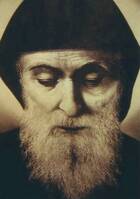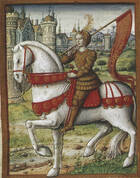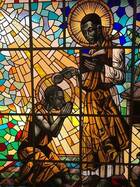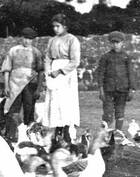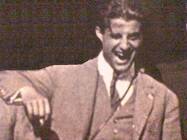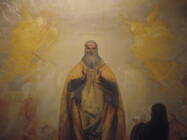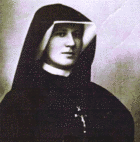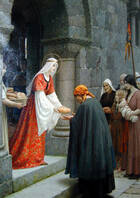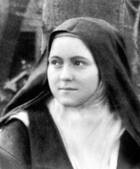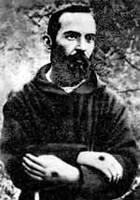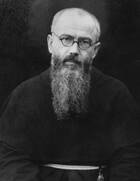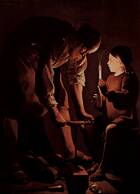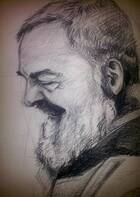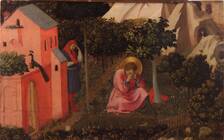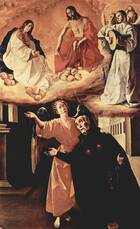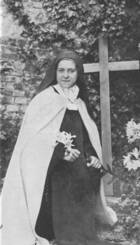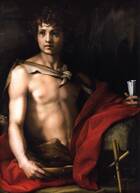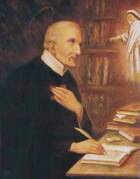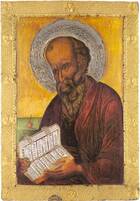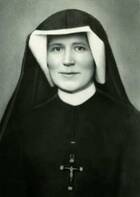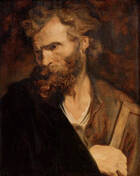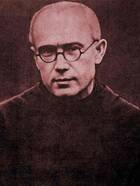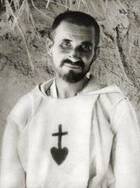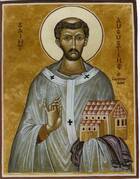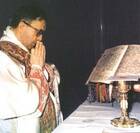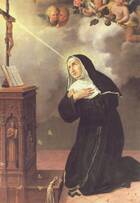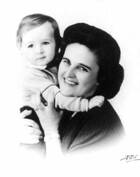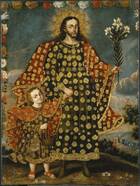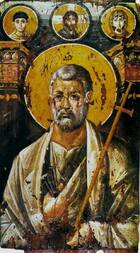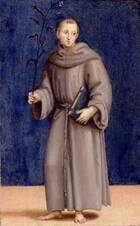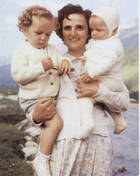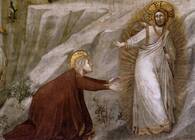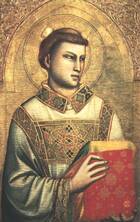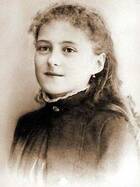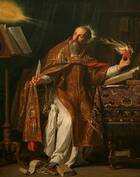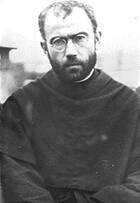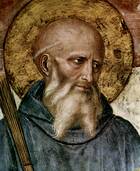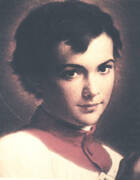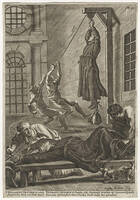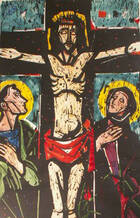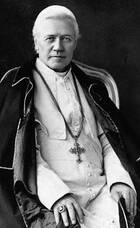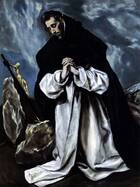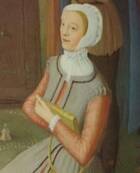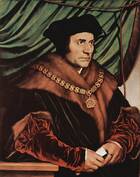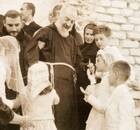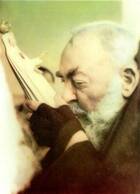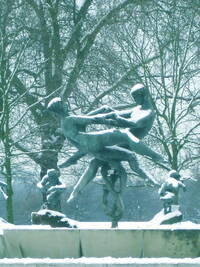
The Incredibles
.. because nothing is impossible to God.
Young people talk about their favourite saints: about their incredible lives and the very real help they give by their witness and their friendship from heaven.
Many thanks to Crossbeam for the gift of their music.
You can subscribe to this Totus2us podcast here on itunes or here from the RSS web feed. To download the free mp3 Totus2us audio recordings individually, right/double click on the play buttons.
Saint Charbel Makhlouf 
Denise, from England: "I really feel that St Charbel is one of the special saints for this time in the history of the Church. At the Vatican he is the number one miracle worker through his intercession .. so heaven itself is putting a spotlight on this saint. .. St Charbel during his life would actually pray very much for the Jews, for the Muslims and for all the faiths in the Middle East. So if you want a really powerful saint to pray for peace in the Middle East, please pray to St Charbel."
Charbel Makhlouf (8 May 1828 - 24 December 1898, from Lebanon) Maronite monk, priest and hermit in the Monastery of St Maron, Annaya, Jbeil District. Beatified on 5 December 1965 & canonized on 9 October 1977. Feast day - 24th July (3rd Sunday in July in the Maronite Calendar)
Saint Joan of Arc 
Michelle, from England: "I particularly love St Joan of Arc because, on the surface level because of her courage and the fact that she was so young and she had such a devotion to God which came out of such great wounds in her life. In the face of everything back in those days, she was just so convicted by her faith and by God speaking to her and she responded in such a magnificent way. .. Also she got such a faithful following of people because she was such an inspirational leader, she was strong and courageous, and I think we need strong and courageous leaders in the world today."
Jeanne d'Arc (6 January c 1412 - 30 May 1431, from France) From a peasant family, Joan had visions of Archangel Michael, St Margaret & St Catherine of Alexandria, instructing her to support Charles VII and recover France from English domination. The uncrowned King Charles VII sent Joan to the siege of Orléans as part of a relief mission - the siege was lifted only nine days later. Several additional swift victories led to Charles VII's coronation at Reims and paved the way for the final French victory. On 23 May 1430, Joan was captured at Compiègne by the Burgundian faction, handed over to the English, put on trial by the pro-English bishop Pierre Cauchon & burned at the stake on 30 May 1431. In 1456, an inquisitorial court examined the trial, debunked the charges against her, pronounced her innocent, and declared her a martyr. She was beatified by St Pius X in 1909 & canonized by Benedict XV on 16 May 1920. Feast day - 30th May.
Saint Kizito 
Graham, 26 & from the United Kingdom: "I think he is a saint especially for our time, with all the problems with marriage and with sexual immorality and with abuse in all sorts of area of the world, especially in Holy Mother Church. I think he’s a real incredible witness to purity and to joy and I think we could all seek his intercession."
Kizito (1872 - 3 June 1886, from Uganda) was one of the youngest of the martyrs of Uganda, slain by the King Mwanga II of Buganda. He was baptized on 25/26 May 1886 by Charles Lwanga (also martyred) & burnt alive on 3 June 1886. He was canonized on 18 October 1964 by Pope St Paul VI. Feast day - 3rd June.
Saint Maria Goretti 
Christine, from England: "I’ve had a long devotion to St Maria Goretti particularly as I’ve become a mother, a mother of four, and the importance of trying to protect my children from all the secular pressures that they’re under, in particular sexual pressures and what that can do to their dignity and their well-being as a child of God. For that intention I’ve always invoked St Maria Goretti. St Maria Goretti was a young girl in Italy from a poor family and she was attacked by a man and he tried to rape her. She fought him off to protect her chastity and her dignity. She was stabbed repeatedly and taken to hospital. On her deathbed in hospital she forgave her attacker."
Maria Goretti (16 October 1890 - 6 July 1902 - from Italy) was a virgin-martyr & is one of the youngest canonized saints. Born to a farming family, her father died when she was nine, and they had to share a house with another family, the Serenellis. Maria took over household duties while her mother & siblings worked in the fields. One day, 20 year old Alessandro Serenellis made sexual advances to her and when she refused to submit to him, he stabbed her 14 times. She was taken to hospital where she died after forgiving him. Alessandro was arrested, convicted, and jailed. Released 27 years later, he visited Maria's mother to beg forgiveness, which she granted. He later became a lay brother in a monastery, dying peacefully in 1970. Maria Goretti was beatified in 1947 & canonized on 24 June 1950 by Pope Pius XII. Feast day - 6th July.
Blessed Pier Giorgio Frassati 
Benedict, 25 & from England: "Recently for my 25th birthday my mother bought me a book on Blessed Pier Giorgio Frassati and at the time all I knew about him was that he’d died at 24 … Reading the book really actually changed my life, encountering this young man who was truly burning with love for the poor and for the needy. He grew up in a wealthy family but with parents who had no real living faith and he was in a very difficult environment in which he wanted to live out his faith and yet his heart was just so different and so burning with desire for God. In politics during his lifetime and fascism, just the way he held so firmly to what he believed and wasn’t afraid .. he knew the truth and he lived it out as best he could. That really touched me, this determination that he had. And his love for the Eucharist. .. And then to think about how many of the poor and disabled and those who were struggling in poverty, how amazingly he touched their lives. He is an incredible witness of charity in action and really going out into where other people don’t want to go and meeting people and bringing the light of Christ into their lives."
Beato Pier Giorgio Frassati (6 April 1901 - 4 July 1925), from Turin in Italy, was dubbed by JPII the 'Man of the Eight Beatitudes' & is one of the patrons of World Youth Day. He was a member of Catholic Action, the St Vincent de Paul Society & the Third Order of St Dominic. After his young death, it was the poor of Turin who petitioned for the cause of his canonization to be opened. Beatified in 1990 by St John Paul II. Feast day - 4th July.
Saint Benedict of Nursia 
Paddy, from England: "My favourite saint is St Benedict and part of the reason for that is that I grew up with a Benedictine spirituality right from a very early age, as did my wife, and as a result of that we have read and studied the Rule of St Benedict many times over. One of the key phrases that come out of the Rule is that it is about being a school of the Lord’s service and a lot of what’s in there is applicable just as much to married life and the family as it is to monks and the monastery."
San Benedetto da Norcia (480–547), from Umbria in Italy, was the founder of the Benedictines; he died at Monte Cassino. He was canonized in 1220 by Pope Honorius III. He is 1 of the Patron Saints of Europe (along with Saints Cyril and Methodius). Feast day - 11th July.
Saint Faustina Kowalska 
Patrick, from Germany: "My favourite saint is St Faustina because her intimate relationship with Our Lord has really opened up a lot of things that I did not really know about Our Blessed Lord. Her prayers, or the prayers she received from Jesus Christ, are so powerful and remind us about the message of mercy, which should always be the focus of our faith, and that we can all get close to Our Lord even though we are all sinners, and that we shouldn't despair and always have hope. "
Maria Faustyna Kowalska (25 August 1905 – 5 October 1938) from Poland, was a Sister of Our Lady of Mercy. She had visions of Jesus and conversations with him, which she wrote about in her diary (The Diary of St Maria Faustina Kowalska: Divine Mercy in my Soul). Known as the 'Apostle of Divine Mercy', she was beatified in 1993 and canonized on 30 April (the 1st Divine Mercy Sunday) in the Jubilee Year 2000 by St John Paul II. Major shrine - Basilica of Divine Mercy, Kraków, Poland
Feast Day - 5th October
Saint Elizabeth of Hungary 
Marianna Grace, who's 6 & from England & America: "I like St Elizabeth because she gives bread to the homeless, the poor, and God gives her roses... she was crowned with virtues."
Elizabeth of Thuringia (7 July 1207 - 17 November 1231 - from Hungary) was a princess of the Kingdom of Hungary, Landgravine of Thuringia, Germany, and an early member of the Third Order of St Francis, for which she is now its patroness. Elizabeth was married at the age of 14, and widowed at 20. After her husband's death she sent her children away and regained her dowry, using the money to build a hospital where she herself served the sick. She was canonized on 25 May 1235 by Pope Gregory IX. Feast day - 17th November.
Saint Therese of the Child Jesus 
Ella, from Hong Kong: "My favourite saint is Saint Therese of Child Jesus. She's actually the most popular saint after Mary and Joseph in China. Wherever you go to the church in China you will find St Therese's statue there, you cannot believe - she is everywhere! I only discovered I was born on her feast day (because I didn't have a devotion to saints previously) and I was born on 1st October and October 1st is also the national day of China so the whole country is in celebration of this national day, so St Therese is linked to China in a special way."
Thérèse of Lisieux (2 January 1873 - 30 September 1897 - from France) was a Carmelite nun who died of tuberculosis at the age of 24. In obedience to her Mother Superior she wrote the story of her life, which was published after her death. 'L'histoire d'une âme (Story of a Soul)' became an immediate 'best-seller' & has been read by millions of people since. In 1907 Pope Pius X called her "the greatest saint of modern times". She was canonised in 1925 & declared a Doctor of the Church by Pope John Paul II in 1997. In 1927 she was named Co-patron of the Missions with St Francis Xavier.
Saint Padre Pio of Pietrelcina 
Xanthe, from England: "I was going through a very, very stressful period in my life where God was leading me to do some really quite challenging things which needed to happen to change my life and I had an incredibly powerful dream of Padre Pio. ... I remember waking up absolutely flooded with comfort and love."
San Pio da Pietrelcina OFM Cap (25 May 1887 - 23 September 1968), from Pietrelcina, Italy. Capuchin priest who suffered the stigmata. Beatified on 2nd May 1999 & canonized on 16th June 2002 by St John Paul II. Major shrine: San Giovanni Rotondo (where he lived and is buried; his body is uncorrupted) Feast Day - 23 September.
Saint Maximilian Maria Kolbe 
Liam, 20 & from the UK: "A lot of my family came from Poland during the war and to see Maximilian Kolbe's sacrifice is kind of like one side of my family but then another side of my faith. I've come from the Hebrew background and he sacrificed himself for a Jewish man. That huge sacrifice is something we need to take account of in our daily lives .. It wasn't anything solely religious, like he did something that anyone could have done but he was the one who chose to do it do and I think it's one of the bravest things that people can ever do - to lay down their life for another person."
Maximilian Maria Kolbe OFM Conv (8 January 1894 – 14 August 1941 - from Poland) is a martyr of love, a Franciscan priest who took the place of another man in Auschwitz.
Feast Day - 14th August
Saint Joseph 
Rod, from England: "I became a Catholic when I was 24 years old and obviously choosing a confirmation saint (because I was going to get baptised and confirmed and everything) was a big question. And I wasn't sure who to choose but my dad being Jewish I wanted a Jewish saint and obviously Joseph fitted the bill but I was kind of like 'He's not very glamorous, he's a bit run of the mill' and there were other interesting saints out there. So I was hesitating and I asked a friend of mine and he said 'I know what you should do, you should write to the Archbishop of Paris' who was Cardinal Lustiger at the time who was himself Jewish by background and had lost his parents in the Holocaust. ... So I wrote a letter to Cardinal Lustiger and some months later I received a beautiful letter back and it was from Father Regis Israel and he said 'Dear Rod, I'm sorry that the Cardinal couldn't reply in person but I would like to confirm you in your choice of saint: Joseph is a beautiful choice, a man of God, a family man, a man of prayer and obviously very Jewish.' So that was very clear to me. And he also put in a little prayer card in there which showed Joseph and Jesus together in the synagogue."
Saint Joseph, Spouse of Mary, Foster Father of Jesus, Patron Saint of the universal Church. Often prayed to for a holy death as it is most likely that Mary & Jesus were with him at his death bed. Feast days: 19th March & 1st May (under the title of St Joseph the worker).
Saint Padre Pio of Pietrelcina 
Mariam, 25 & half Egyptian, half Lebanese/Iraqi: "Padre Pio really gives me hope even when we are hopeless. And he always said ‘Pray, hope and don’t worry. God is merciful and He will hear your prayer.” So I always carry these words with me and I remember them whenever I feel like my life is a bit torn. So those are miraculous words really for the heart and I hope you can take them with you as well: 'Pray, hope and don't worry. God is merciful and He will hear your prayer.'""
San Pio da Pietrelcina OFM Cap (25 May 1887 - 23 September 1968), from Pietrelcina, Italy. Capuchin priest who suffered the stigmata. Beatified on 2nd May 1999 & canonized on 16th June 2002 by St John Paul II. Major shrine: San Giovanni Rotondo (where he lived and is buried) Feast Day - 23 September.
Saint Augustine of Hippo 
Kate, 27 & from Ireland: "I think the saint that probably has had most influence in my life has been St Augustine and that is because I identified with him in his rebelliousness and his struggle to walk with God because he had a deep desire to know him and to love him but he couldn't for so many years actually do it .... It has been really interesting because since I have had my conversion two years ago back to my faith little things have cropped up. .... That's the beauty of the Catholic Church is that we have this bank of people that are praying for us and that are so instrumental in the little graces that we receive every single day to come closer to God because they are interceding for us because they in heaven have the full knowledge and full image of what it is to be a community and to be God's children. So to have that amazing richness of the Catholic faith that all of these people are praying for you and loving you and helping you each and every day to a closer relationship with Jesus. It's pretty cool!"
St Augustine of Hippo (354 - 28 August 430), from Numidia (now Algeria). Father of the Church. Son of St Monica. After his conversion. became Bishop of Hippo. His writings (eg Confessions, City of God) have had huge influence in Western culture. Major shrine: San Pietro in Ciel d'Oro, Pavia, Italy.
Feast Day - 28th August (15 June in Eastern Christianity, 4 November in Assyrian church)
Saint Alphonsus Rodríguez 
Sarah, 31 & from London: "He was a porter for 40 years and he never went beyond that but he just did it with good grace. He had the gift of holy conversation, people sought him out for spiritual advice and he was just so gracious to everybody he met, and he was very well known for that. I suppose because of that post, he never had any writings or teachings, but his life was such a witness that people just flocked to him. St Peter Clavier was the saint who went to him for spiritual advice. The reason why I admire him is because he had so many losses in his life, so many things went wrong and he was forced to do so many things that would be deemed not the best things to do … it was like one thing after another, but he never lost that grace and he never lost that joy and that faith in God, and he was able to transmit that to others. And he was canonized so I think he was victorious in the end!"
San Alonso Rodríguez SJ (25 July 1532 - 31 October 1617), from Segovia, Spain. Jesuit Brother. Canonised in 1888 by Pope Leo XIII.
Feast Day - 30th October
Saint Theresa of Lisieux 
Johnny, who's from Britain: "I've prayed to the Little Flower, St Theresa of Lisieux, all my life. I venerated her relics in Ireland (I went especially to Ireland) and in England. I'm married, we had two boys and we wanted a little girl. So we went to Aylesford Priory, and me and my wife prayed at the white statue of St Therese in the garden at the same time. Twelve months later we had our little girl, and I say to my little girl 'Are you Daddy's little flower?' and she says yes and she picks me little flowers from the garden."
Anne, who's from England: "I want to encourage anybody that is going through any kind of trauma or distress to turn to St Therese because she has been there herself. When she was a child and her sister entered Carmel and her mother died, she got very ill in bed. Nobody knew what to do and in the end Our Lady healed her but she knows what it is like to suffer trauma and emotional distress. As soon as I prayed to her I just felt her love and prayers, and she has helped me so much, so I recommend her to anyone, especially young girls."
St Thérèse of the Child Jesus & the Holy Face - Carmelite & Doctor of the Church, Co-patron of the Missions & Co-patron of France. Born on 2 January 1873, died in Lisieux on 30 September 1897. Autobiography: L'histoire d'une âme (Story of a Soul). Feast Day - 1st October
Saint John the Baptist 
Charlotte, 11 & from England: "My favourite story in the Bible is John the Baptist because, from the words, he sounds a very energetic, wild man who preaches the good news."
יוחנן המטביל (born in ate 1st century BC in Herodian Judea; martyred in AD 31 in Machaerus, Perea). Son of Zachariah & Elizabeth. Last prophet of the Old Testament. He features in the Rosary at the Visitation (when he leaps for joy in Elizabeth's womb at the greeting of Mary) & the Baptism in the Jordan (when he baptises Jesus).
Feast Days: Birthday - 24th June; Martyrdom (beheaded on orders of King Herod) - 29th August. Patron Saint of Jordan & Puerto Rico.
Saint Alphonsus de Liguori 
Brice, 32 & from the USA: "He is the Church Doctor of morality and the reason he’s my favorite saint is he brings profound clarity on the position of both free will, decision making, and the teachings of the Catholic Church, and particularly how the Church and its guidance and directions actually open up who we are as individuals and he sheds light on the beauty of both Church teaching and how we become great people through being Catholic."
San Alphonso Maria de' Liguori (1696 - 1 August 1787), from Campania, Italy. Founder of the Redemptorists, Bishop & Doctor of the Church. Patron of confessors and moralists.
Feast Day - 1st August
Saint John the Apostle & Evangelist 
Christopher, from the UK: "For me, John’s Gospel provides a window into understanding the love of Jesus and the Father, and their relationship. John the Evangelist was someone who would have known Jesus so intimately, who rested on his bosom at the Last Supper, got so close to listen to his words, that he became so effected by him that his words would have stayed with him his whole life and they can be found on the page of the Gospel in Jesus' long discourses, where we see the most beautiful love letters ever written between the Father and the Son."
John the Apostle (c AD 1 – c 100), from Bethsaida, Judaea (in the Roman Empire) was the youngest of the 12 Apostles. Author of the Gospel of John, the three Epistles of John and the Book of Revelation, written on Patmos. He died in Ephesus.
Feast Day - 27th December
Sainte Faustine Kowalska 
Marie-Pierre, a seminarian from Congo-Kinshasa (in French): "Ma sainte préférée c'est Sainte Faustine Kowalska parce que c'est une sainte qui m'a appris à aimer Dieu par des petites choses, par sa miséricorde, qui a eu presque une histoire semblable à la mienne. Une sainte d'une famille pauvre et qui aime Dieu et qui veut se donner malgré les limites des moyens, malgré les limites de ce que les gens peuvent voir. Mais sa relation avec le Christ c'est ce qui était le plus fort, et trés souvent je me confie à la Sainte Faustine pour mes amis en récitant le Chapelet de la Miséricorde tous les jours à quinze heures."
Maria Faustyna Kowalska (25 August 1905 – 5 October 1938) from Poland, was a Sister of Our Lady of Mercy. She had visions of Jesus and conversations with him, which she wrote about in her diary (The Diary of St Maria Faustina Kowalska: Divine Mercy in my Soul). Known as the 'Apostle of Divine Mercy', she was beatified in 1993 and canonized on 30 April (the 1st Divine Mercy Sunday) in the Jubilee Year 2000 by St John Paul II.
Major shrine - Basilica of Divine Mercy, Kraków, Poland
Feast Day - 5th October
Saint Jude 
Sarah, from the USA: "My favorite saint is Saint Jude because he's the patron saint of lost causes."
Jude the Apostle, born in 1st century AD in Galilee, Judaea (Roman Empire). Martyred in 1st century in Persia. One of Jesus's twelve disciples (nicknamed Thaddeus).
Patron Saint of Armenia.
Feast Day - 28th October (19th June in Eastern Christianity)
Saint Maximilian Maria Kolbe 
Adam, a seminarian from the USA: "There was St Maximilian Kolbe who never lost his dignity of himself and of his fellow prisoners. And it was his love of Jesus through the Immaculate Heart of Mary that allowed him to love both his fellow prisoners but also the guards there too. And it was also that same love for the Blessed Mother that allowed him to step out of line. As we were there in the courtyard what really rung true is that I've always heard the story that Maximilian Kolbe stepped out of line to take the place of this prisoner who was chosen to die for someone else who had escaped."
Maximilian Maria Kolbe OFM Conv (8 January 1894 – 14 August 1941 - from Poland) was a Franciscan friar who was killed in Auschwitz during the Second World War. He was beatified in 1971 by Pope Paul VI & canonized on 10 October 1982 by Blessed John Paul II as a "martyr of charity", being described as the "Patron Saint of Our Difficult Century".
Feast Day - 14th August
Blessed Charles de Foucauld 
Mark, who's 22 & from England: "Charles de Foucauld was born in Paris and was the son of a Count. Very early in his life he lost his faith and he led up until he was about 26 a fairly wild life; he had mistresses, and drinking, and he was a soldier, and he'd completely rejected the idea God existed. Anyway he had a great crisis in the middle of his twenties and he said very profoundly 'The moment I realised that God exists, I realised I had to give my life to him.' .. So he became a religious and he moved to the middle of the Sahara desert, to the middle of an Islamic tribe, and he set up a church. And in the middle of this tribe he planted the Blessed Sacrament, he planted Jesus Christ Himself, and he allowed the presence of the Eucharist to change his life and to change the lives of those around him. He allowed the simple presence of Jesus, body, blood, soul and divinity, to transform his heart. "
Bienheureux Charles to Foucauld - born in France, on 15 September 1958; killed on 1 December 1916 in Tamanrasset, French Algeria. Beatified by Pope Benedict XVI on 13 November 2005. Feast day - 1 December.
Saint Augustine of Canterbury 
Jan, who's 25 & from England: "St Augustine of Canterbury had a wonderful role to play and I'm very grateful to having been enlightened as to the heritage and roots of the Catholic faith in England."
Saint Augustine of Canterbury - born in Rome in 6th century; died in Canterbury on 25 May 604. Major shrine - St Augustine's, Ramsgate. Feast day - 27 May.
Saint Josemaría Escrivá 
Matthew, who's 23 & a seminarian from the USA: "The reason I admire St Josemaría Escrivá, look up to him so much, is because I encountered his writings when I was younger and he introduced me to Our Lord when I was still in school. What really attracted me was his message to look for holiness in the ordinary events of daily living. As a student that was like perfect, because I was involved in sports and family life and friends and school, and so it was like 'Oh, I'm called to be holy even though I'm doing all these other things too.'"
Santo Josemaría Escrivá (9 January 1902 – 26 June 1975) - from Spain. Beatified on 17 May 1992 & canonized on 6 October 2002 by Blessed Pope John Paul II. Major shrine - Our Lady of Peace, Prelatic Church of Opus Dei in Rome. Feast day - 26 June.
Saint Rita of Cascia 
Timothy, who's 23 & from England: "She’s a very powerful saint who, like St Therese, will send a rose as a sign of her intercession. And also she's a great saint for all those who have dysfunctional families and warring families, and arguments and strife in their own families. She knows what it is to experience domestic violence, she knows what it is to lose a child and children, she knows what it is to struggle and persevere in her religious vocation. ..Even if you're not sure of your own vocation or your own relationship with God, speak to St Rita, because she knows what it is to experience the hardship of life and she'll guard you and protect you always."
Santa Rita da Cascia (1381 – 22 May 1457) - from Italy. Canonized on 24 May 1900 by Pope Leo XIII. Major shrine - Cascia, Italy. Feast day - 22 May
Saint Gianna Beretta Molla 
Sarah, who's 19 & from North Dakota in America: "St Gianna is my favourite saint because she's prolife and she was a doctor and she cared for everyone and she loved her family and she gave her life for her daughter who is now also a doctor and that's huge in my life."
Santa Gianna Beretta Molla (October 4, 1922 – April 28, 1962) - from Italy. Pediatrician, wife and mother, tertiary Franciscan. Beatified on 24th April 1994, & canonized on 16th May 2004 by Bl John Paul II.
Feast day - 28th April
Saint Joseph 
John, from England: "St Joseph, in my experience, takes us to the wire. He likes to teach us the virtues of patience and humility. He never strove for the front place. St Joseph is ones of those classic behind-the-scenes people, who gets things done, and he gets things done in a marvellous way. There are countless examples of St Joseph in many, many lives, changing things for the better, bringing people closer to God, bringing people closer to themselves, to help them to be the person God wants them to be."
Saint Joseph, Spouse of Mary, Foster Father of Jesus, Patron Saint of the universal Church. Feast days: 19th March & 1st May.
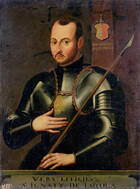
Saint Ignatius of Loyola 
Carlos, who's 18 & from Spain, gives his response in English & Spanish: "What I most like about St Ignatius is how he resigned all his vanity and all the things he had, all the choices he had, and he gave it all away in exchange for following Jesus, like the disciples did. I really admire him for that. I wish we could all do that but sometimes it's not that easy."
San Ignacio de Loyola (1491 – July 31, 1556) - from Spain. Founder of the Jesuits.
Feast day - 31st July
Saint Peter the Apostle 
Br John Baptist CFR, who's 28 & from the United States: "Probably the most striking thing for me about St Peter is he's a man who kept saying yes to the Lord, despite his weakness, despite whatever - how big or small the task was that Jesus was calling him to, he continued to say yes. And he didn't always do it perfect and the beautiful thing is that Jesus made up for the lack, he made up for the slack in Peter's life. And I think it was through that continual saying yes to the Lord that he became this great man of faith."
Trevor, who's from London: "My favourite bit in the Bible is when Jesus walks on the water and I think Peter for the first time realises who Christ is. Peter says 'Lead me, Lord, for I am a sinful man.' That bit just strkes me that Christ can use someone in their absolute humanity."
St Peter - 1 of Jesus's 12 Apostles, 1st Bishop of Rome, martyred in 64 in Rome. Feast days - Chair of St Peter - 22 January; with St Paul the Apostle - 29 June
Saint Anthony of Padua 
Senam, who's 13 & from Ghana: "I chose him for my confirmation and he's just the one for me. I think he's special because at a young age his family wasn't really into God that much. All they knew about was spoiling him with gifts and riches. But it was his decision to take God in his life and that's a very strong point for him."
Cecily, who's 20 & from Germany, gives her response in English & German: "My favourite saint is Saint Anthony as I lose a lot of things and pray to him very often. Nearly all my things come back to me and I admire the work he does for me."
Santo Antônio de Pádua (15 August 1195 – 13 June 1231) - from Portugal. Franciscan Priest and Doctor of the Church, on whom Pope Benedict XVI has given a catechesis.
Feast day - 13th June
Saint Gianna Molla 
Gerald, who's 23 & from England: "She's one of the Patron Saints of the Unborn. She grew up in Italy and worked for Catholic Action. She was a very studious youngster and then she got into medicine and her calling was in medicine. She got married and had several children. When she was pregnant with her last child, there was some sort of complication and there were suggestions of perhaps some sort of abortion, but she said that if there's any question about it, save the life of the child, not me. And she died after childbirth, and it was that child who was with her husband at her beatification, about 40 years later. That's why I love her."
Santa Gianna Beretta Molla (October 4, 1922 – April 28, 1962) - from Italy. Pediatrician, wife and mother. Beatified on 24th April 1994, & canonized on 16th May 2004 by Bl John Paul II.
Feast day - 28th April
Saint Mary Magdalene  in Dutch
in Dutch 
Marijke, who's 23 & from the Netherlands: "When I became a Catholic I chose St Mary Magdalene as my patron saint because she really was focused totally on God, on Jesus, and she didn't care what other people thought about it, she just completely lived for Him. She helped me to keep focused on Jesus and to completely live only for Him in my day to day life."
St Mary Magdalene - dates of birth & death unknown; thought to have died in Saint-Maximin-la-Sainte-Baume, in the south of France. Feast day - 22nd July
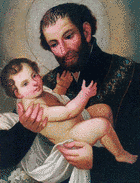
Saint Cajetan 
Tom, from the UK: "Why I like St Cajetan is a) because of this reliance on Divine Providence and b) because he's widely known as the helper of people who are unemployed or need jobs or who want to keep their jobs. And he's a great helper in that because his message of Divine Providence is that God will provide. Many, many people have prayed to him, for their jobs, to gain a job, and I think in these times of crisis we should all turn all together with same trust as St Cajetan towards God, just trusting Him that all will be well, however bad it might seem, all will be well. So I really commend to you to say a prayer to St Cajetan and all will be well."
San Gaetano dei Conti di Tiene (1 October 1480 – 7 August 1547) - from Italy. Founder of the Theatines.
Feast day - 7th August
O Glorious St Cajetan, Father of Divine Providence, help all those who are unemployed, who search for employment and who fear for their jobs, lead them towards what they are looking for and pray for us all that we may be courageous in the face of adversity.
Saint Stephen 
Joe, 14 & from the UK: "My favourite saint is St Stephen because he is the patron saint of altar servers and I'm an altar server; so after Mass, I pray to him. He's also my favourite saint because he was the first martyr."
Stephen, the Protomartyr (died c 34) was the first Christian martyr, stoned to death outside the city walls of Jerusalem.
Feast day - 26th December (as close as possible to the birthday of Jesus Christ)
St Thérèse of the Child Jesus & the Holy Face 
Heidi, 31 & from the USA: "St Thérèse is one of my favourite saints because of many reasons but one of the main reasons is her capacity to love. Whenever I think of her, I think of love. She was so loved by her family, growing up, and then as a Carmelite, her love for God and for the Church was so evident. And, as she promised, when she went to heaven she would do good on earth, which is her love for us. And it's apparent the whole time, when you say her novena or at least when I say her novena, I definitely feel her working and feel her intercessions."
Thérèse of Lisieux (2 January 1873 - 30 September 1897 - from France) was a Carmelite nun who died of tuberculosis at the age of 24. In obedience to her Mother Superior she wrote the story of her life, which was published after her death. 'L'histoire d'une âme (Story of a Soul)' became an immediate 'best-seller' & has been read by millions of people since. In 1907 Pope Pius X called her "the greatest saint of modern times". She was canonised in 1925 & declared a Doctor of the Church by Pope John Paul II in 1997 (1 of 3 women Doctors of the Church, with St Teresa of Avila & St Catherine of Siena). In 1927 she was named Co-patron of the Missions with St Francis Xavier &, in 1944, Co-patron of France with St Joan of Arc.
Feast day - 1st October.
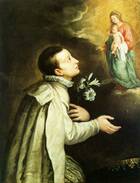
Saint Aloysius Gonzaga 
Amirah, 12 & from Congo: "One of the saints that inspires me is St Aloysius because he was a rich man and he gave it all up and acted poor just to understand how the poor people felt. So he wasn't out partying all the time and he was actually considerate of other people. Like, most people take advantage of the amount of money they have, but he didn't do that. Even though he could get everything he wanted, he refused and like shared it all, and that's really inspiring."
San Luigi Gonzaga (born 9th March 1568 - died 21st June 1591) - from Northern Italy, was a Jesuit novitiate. He took the vows of chastity, poverty and obedience, but died before becoming a priest, at the age of just 23. He was beatified only 14 years later by Pope Paul V. In 1726 he was canonized together with another Jesuit novice, Stanislaus Kostka, by Pope Benedict XIII. In 1729 he was also declared Patron Saint of young students and, in 1926, Patron of Christian youth by Pope Pius XI. His tomb is in the Jesuit Church of Sant'Ignazio in Rome.
Feast Day - 21st June
Saint Augustine 
Christopher, 17 & from the United States of America: "The way he lived his life proves to all of us that God never gives up on any of us. He didn't have a great life and he spent his money on drinking and women. His mother prayed for him every day and night for ever, so that one day he would share in her faith, and he did and he turned his life all the way around and became one of our great saints."
Augustine of Hippo (13 November 354 - 28 August 430 - from Thagaste, Numidia (now Algeria)) was Bishop of Hippo. He was declared a Doctor of the Church by Pope Boniface VIII in 1298. His best known works are City of God, Confessions and On Christian Doctrine. Benedict XVI has given 5 catecheses about him. Feast Day - 28th August
Saint Maximilian Maria Kolbe 
Gavin, 25 & a seminarian from England: "Maximilian Kolbe was a fantastic man who was a Franciscan priest and it was his passion to spread the Good News throughout the world. This saw him setting up a printing press in Poland and going as far as Japan to spread the Good News of the Gospel. During the Nazi regime that took hold, he was arrested and sent to Auschwitz for speaking out about human dignity. While he was at Auschwitz he continued to live that Gospel message of spreading truth and love. And he really did show hope where there was despair, he showed love where there was hatred. In his time at Auschwitz he would listen to confessions, where possible; he would celebrate Mass, when possible, and he lived a truly devout and holy life. He always had a massive passion for Our Lady as well and took her role as true disciple to heart. Father Maximilian Kolbe was a man who, through his passion for the Gospel, gave his life for another man in Auschwitz."
Maximilian Maria Kolbe OFM Conv (8 January 1894 – 14 August 1941), from Poland, was a Franciscan friar who was killed in Auschwitz during the Second World War. He was beatified in 1971 by Pope Paul VI & canonized on 10 October 1982 by St John Paul II as a "martyr of charity", being described as the "Patron Saint of our difficult century". Feast Day - 14th August
Saint Benedict  in German
in German 
Sylvester, 16 & from Austria, gives his response in English & German: "I read a book about St Benedict and I was very interested and impressed by what he did; how he was able to communicate with God. He had such a strong faith that he was able to really understand what God wanted out of him and thereby really enabled great things to happen. Many of his monasteries still exist today, including Monte Cassino, and the Benedictine monks are around the world and their work is great."
San Benedetto da Norcia (480–547), from Umbria in Italy, was the founder of the Benedictines; he died at Monte Cassino. He was canonized in 1220 by Pope Honorius III. He is 1 of the Patron Saints of Europe (along with Saints Cyril and Methodius). Feast day - 11th July
Saint Dominic Savio 
Richard, a seminarian from England: "He was an Italian boy, who with the salesians was under the direction of St John Bosco. He died at the age 14 but the reason why he was canonised was his life of virtue and resisting peer pressure .. He had a strong will and loved Jesus and Mary, and dedicated himself to them and so with their grace he was able to resist temptations .. He is a really great example of how one can put one's hands into Our Lord's and trust in Him to keep one pure and free from sin."
San Domenico Savio (2 April 1842 - 9 March 1857), from Turin in Italy, had his life documented in St John Bosco's biography, The Life of Dominic Savio. For his "heroic virtue" in his everyday life, Pope Pius XII canonised him on 12 June 1954. Feast day - 6th May
Saint Nicholas Owen 
Richard, who's 25 and a seminarian from England: "He is one of the 40 martyrs of England and Wales. He was a lay brother of the Jesuit order and built priest holes in recusant houses so that priests could be harboured in them - they could celebrate Mass there and escape into these holes when a raid happened. Arguably he's one of the saints that kept the faith alive in England, the key man really because if it wasn't for these holes then lots of priests would have been arrested .. He died whilst being tortured on a rack.. I think he's an inspiring character."
Nicholas Owen (died 1606), from England was a Jesuit lay brother. He was first arrested in 1582/3, after the execution of Edmund Campion, for publicly proclaiming Edmund's innocence, but was later released. He was arrested again in 1594 and, although tortured, revealed nothing. He was released after a wealthy Catholic family paid a fine on his behalf, the jailers believing that he was merely the insignificant friend of some priests. He resumed his work, and is believed to have masterminded the escape of Jesuit Father John Gerard from the Tower of London in 1597. He was arrested a final time in 1606 at Hindlip Hall, giving himself up voluntarily in the hope of distracting attention from some priests hiding nearby. Despite gruesome torture he revealed nothing to his inquisitors. He was canonized as 1 of the 40 Martyrs of England and Wales by Pope Paul VI on 25 October 1970.
Feast day - 25th October
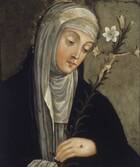
Saint Catherine of Siena 
Frankie, who's 33 and a seminarian from England: "My incredible is St Catherine who was from Siena in Italy and she was quite an extraordinary lady. She was famous for saying: 'If you are what you are meant to be, you will set the whole world ablaze.' St Catherine certainly lived that message in her life even though she died at just 33. Catherine was a lay lady who was a Third Order of the Dominicans; she never quite joined an Order because she felt that God was telling her that He had plenty of work for her to do in the world. One of the most famous stories about Catherine is that she travelled to France to see Pope Gregory XI who at that time resided in Avignon and it was through Catherine exhorting him energetically that he effectively moved back to take his proper chair of Peter back in Rome, and she did this through a prophecy she had for him. She said to him: "Fulfill what you have promised to God.'"
Santa Caterina da Siena (25 March 1347 - 29 April 1380), from Italy, was a tertiary of the Dominican Order, and a Scholastic philosopher and theologian. Pius XII made her joint Patron Saint of Italy (along with St Francis of Assisi); Paul VI proclaimed her a Doctor of the Church in 1970 (along with St Teresa of Ávila) & Blessed John Paul II made her 1 of Europe's Patron Saints in 1999. You can visit her tomb at the Ciesa di Santa Maria sopra Minerva in Rome (her sarcophagus is beneath the high altar). Feast day - 29th April.
Saint John the Apostle 
Noelita, who's 26 & from England: "The saint who is very special to me is John the Disciple, I think for 3 reasons: the first being he was the youngest of all the disciples and he had a strong faith from a young age, which is something I felt I could resonate with, so somebody I could turn to and talk to in my youth, as a young person. The second thing is I've always admired how, when everyone else deserted him at the Cross, how he was there and how he managed to find the strength to keep his faith and to be there for Our Lord in his moment of weakness and pain is something I have always admired. And the third is the Last Supper, the idea of when he rested his head on Jesus's breast, the idea of how he surrendered his intellect, almost his mind, to be absorbed completely next to Jesus's heart which has always made me think how he surrendered his mind to his heart and to give his love completely to Jesus."
John the Apostle and Evangelist - one of the 12 disciples of Jesus. Writer of the Gospel of John, 2 letters and the Book of Revelation. Feast day - 27 December.
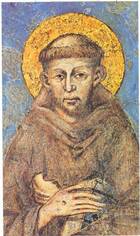
Saint Francis of Assisi 
Tom, who's 29 & from London: "I have been really caught up with St Francis of Assisi since being a teenager. One of the ways that I was inspired by him is the way that he tried to follow in the footsteps of Christ in 3 different areas: through the Incarnation, through the Cross and through the Eucharist. The Incarnation of Christ coming to us as a child, and the way he held the manger up to people, but also how God is in the world in the face of our neighbour, in creation, and is to praised in all things. The cross for St Francis was the centre part of his following of Christ, of taking up the cross, of that complete outpouring of love; so much so, that he talked about carrying the cross on his own back and he actually received the wounds of Christ on his own body, he was so enveloped in the passion of Christ. And the Eucharist for St Francis was the most important thing about is spirituality, about his relationship with Jesus, that meeting in the Eucharist which has been given to the Church and that wonderful opportunity of communion with Christ each day. And for me there are 3 simple words that sum that spirituality: blessed, broken and given - and that is what St Francis means to me."
San Francesco d'Assisi (1181/2 - 3 October 1226), from Italy, founded the Franciscan Order and helped St Clare found the Order of St Clare. In 1223 he arranged for the first Christmas manger scene and in 1224 he received the stigmata (the 1st person known to have borne the wounds of Christ's passion). Thanks to his visit to Egypt and attempted rapprochement with the Muslim world, after the fall of the Crusader Kingdom it was the Franciscans who were allowed to stay on in the Holy Land and became recognised as the 'Custodians of the Holy Land' on behalf of Christianity. Pope Gregory IX pronounced Francis a saint on 16 July 1228. He is patron saint of Italy along with St Catherine of Siena. Feast day - 4th October.
Saint Pius X 
Andrew, who's 23 & from Wales: "Pius X died in 1914 at the time of the First World War. He couldn't comprehend the notion of Catholic fighting against Catholic and often seminarian being forced to fight against seminarian, whether they were German or English - that notion couldn't gel with his mind. He was said to have even prayed that God would accept him as a sacrifice, if to prevent the war. So we could say that he died of a broken heart almost."
Papa San Pio X (2 June 1835 - 20 August 1914), from Italy, was the 257th Pope (1903 - 1914, after Pope Leo XIII). He had a great love for Mary; in his encyclical Ad Diem Illum Laetissimum he wrote of renewing all things in Christ and that there was no surer or more direct road than by Mary. Pius X was canonised in 1954 by Pius XII who called him the "Pope of the Eucharist". Feast Day - 21st August.
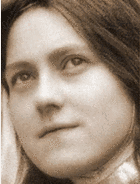
Saint Thérèse of Lisieux 
Erin-Thérèse, who's 28 & from America: "You never hear a phrase from Saint Thérèse that doesn't include the word 'love'. Her little way is to do small things with great love. Her motto was 'Love is repaid by love alone.' In speaking about God, she said 'I do not regret having given myself up to love.' This was her way of abandoning herself to God. She was in love with God, because she was in love with love. Even her last words were 'My God, I love you.'"
St Thérèse of the Child Jesus and the Holy Face (2 January 1873 - 30 September 1897), from France, was a Carmelite nun in Lisieux who, in obedience, wrote her memoir 'The Story of a Soul'. She was canonized in 1925 and declared co-patron of the missions with St Francis Xavier in 1927, and co-patron of France with St Joan of Arc in 1944. In 1997, St John Paul II declared her a Doctor of the Church. Feast Day - 1st October.
Saint Dominic 
Piers, 30 & from England: "St Dominic combined the spiritual with the intellectual, he brought that into the order that he founded [the Order of Preachers - Dominicans], so he and his followers were able to defend the faith at a time when there was the Albigensian heresy. It was a terrible heresy, some ways slightly similar to the culture of death today, but he managed through developing prayer and study, to defeat this great heresy."
Dominic de Guzmán (1170 - 6 August 1221), from Spain, was the founder of the Dominicans (Order of Preachers). He was canonized by Pope Gregory IX in 1234 & is the Patron Saint of astronomers. Feast Day - 8th August
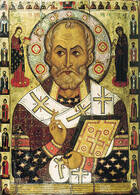
Saint Nikolaos 
Markus, from Germany: "St Nicholas is important to me because of all the works he did and the wonders he worked. He was the bishop of Myra, and he was famous for helping the poor and giving in a very secret way .. Thinking about St Nicholas is about this saint who did something very secretly, with lots of love and was happy that the honour for what was done was given to God."
(You can listen to Markus's response in English or German.)
Nikolaos (from 4th Century AD) was Bishop of Myra (in Lycia, now part of Turkey). He is the patron saint of sailors, merchants, archers, thieves, children, and students in Greece, Belgium, France, Romania, Bulgaria, Georgia, Albania, Russia, the Republic of Macedonia, Slovakia, Serbia, and Montenegro. Feast Day - 6th December.
Saint Margaret Clitherow 
Philip, 25 & a seminarian from England: "St Margaret was a wife and mother, martyred in 16th century York for helping Catholic priests in their mission to convert England back to the Catholic faith. She had a priest hole in her home and another elsewhere in York where she could hide priests so that local Catholics could receive the Sacraments. She was executed on 25th March 1586 by being squashed by a wooden board with heavy stones on it. She inspires me because she gave her life for the protection of priests, or, as I heard a priest put it recently in a homily, she died so that I could celebrate the Sacraments."
Margaret Clitherow (1556 - 25 March 1586, from England) was beatified by Pope Pius II in 1929 and canonised, along with other martyrs from England & Wales, by Pope Paul VI on 25 October 1970. Feast Day - 30th August
Saint Thomas More 
John, from England: "I chose St Thomas More as my confirmation name and this was because I had watched the film, Man for All Seasons, and I was very inspired by his honesty and his openness to God, and where he was willing to give his life for the truth. I love the scene where his best friend, the Duke of Norfolk, comes to him and asks him to sign the Act of Succession, which would save his life, for friendship's sake. And he says to the Duke of Norfolk, 'When we get to heaven and you're allowed to stay because you've done your conscience and I'm going to hell because I haven't done my conscience, would you take my hand and come to hell with me for friendship's sake?' I really felt that was where someone was willing to stand up, against even his friends, for truth and for Christ."
Thomas More (7 July 1478 - 6 July 1535, from England) was beatified by Pope Leo XIII in 1886 and canonised, with Bishop John Fisher, by Pope Pius XI on 19 May 1935. In 2000, Pope John Paul II declared St Thomas More the heavenly patron of statesmen and politicians: "The life and martyrdom of Saint Thomas More have been the source of a message which spans the centuries and which speaks to people everywhere of the inalienable dignity of the human conscience, which, as the Second Vatican Council reminds us, is "the most intimate centre and sanctuary of a person, in which he or she is alone with God, whose voice echoes within them". Whenever men or women heed the call of truth, their conscience then guides their actions reliably towards good. Precisely because of the witness which he bore, even at the price of his life, to the primacy of truth over power, Saint Thomas More is venerated as an imperishable example of moral integrity. And even outside the Church, particularly among those with responsibility for the destinies of peoples, he is acknowledged as a source of inspiration for a political system which has as its supreme goal the service of the human person." Feast Day - 22nd June.
Saint Padre Pio of Pietrelcina 
Niall, from England: "When I was growing up I had a lot of fear in my heart and, because for me it was normal, I didn't realise it could be any different. But as I started to pray I started to realise that God didn't want that, I remember I came across something that Padre Pio had said: 'Fear is a greater evil than evil itself.' In other words it's fear that stops us from being alive, it's fear that stops us from reallly enjoying the life that God has given us. And I always remember the words 'He is a good friend' because I really believe the saints aren't just people for us to admire and imitate, they're much more than that, they are actually friends and we shouldn't be afraid to speak to them like we would to a friend. And the love they have for us is so warm and so sincere and so compassionate .. For me, Padre Pio would be that, like a friend, I know that I can ask him for help, and I know that he is someone who suffered and who understands. He said a beautiful thing to his spiritual children: that when he got to heaven, he wouldn't go in, he'd hold the door open for them."
Padre Pio OFM Cap (25 May 1887 - 23 September 1968), from Italy, was canonised on 16th June 2002 by Pope John Paul II: "The life and mission of Padre Pio prove that difficulties and sorrows, if accepted out of love, are transformed into a privileged way of holiness, which opens onto the horizons of a greater good, known only to the Lord. Is it not, precisely, the "glory of the Cross" that shines above all in Padre Pio? How timely is the spirituality of the Cross lived by the humble Capuchin of Pietrelcina. Our time needs to rediscover the value of the Cross in order to open the heart to hope." Feast Day - 23rd September.

